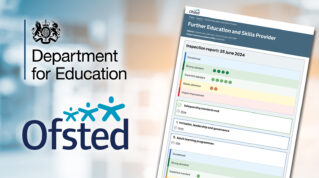The Department for Education has promised to “capture views” before determining new intervention triggers for colleges and training providers from reformed Ofsted inspections.
A new style of report cards comes into force from November 10, with no routine inspections of FE and skills providers in the first half of the autumn term.
The DfE this week published a refreshed school accountability regime alongside Ofsted’s final plans for how the report cards will look and work.
But there has been no word on how post-16 intervention, accountability and oversight policies will change when the new inspection process is rolled out.
Until now, training companies receiving an ‘inadequate’ grade in an inspection, either overall or for a sub-judgment, faced contractual penalties. These range from enforceable requirements to improve and suspensions to learner starts through to contract termination.
The DfE extended Ofsted performance rules to independent providers with back-to-back ‘requires improvement’ this August.
Colleges have also been kicked out of the apprenticeship delivery market if they received Ofsted’s lowest possible judgment.
From November, there will be no overall headline judgments for FE and skills providers. Instead, there will be a new colour-coded five-point grading scale which will be applied across up to 16 areas and grade providers as either ‘urgent improvement’ (red), ‘needs attention’ (orange), ‘expected standard’ (green), ‘strong standard’ (dark green), or ‘exceptional’ (blue).
The DfE told FE Week it will soon start engaging with the FE sector to update intervention and accountability policies in line with Ofsted’s new methodology and grading.
Officials said this will involve determining new intervention triggers which will be published and communicated to the sector “prior to Ofsted commencing inspections using the renewed framework evaluation areas”.
The DfE added that it is planning a series of stakeholder engagement activities with the sector over the next month to set out proposals and capture views.
Officials made clear, however, that where provision is “clearly of poor quality, our response will remain firm” and added: “We will continue to act where judgements in the new framework highlight serious concerns about quality.”
The DfE said it recognises the sector’s concerns around increased complexity and rushed implementation timing, and committed to taking a “pragmatic, proportionate approach, particularly during the first 12 months, ensuring decisions are made on a case-by-case basis, with the learner experience at the core”.
Report cards will ramp up leader anxiety
Ofsted commissioned Sinéad Mc Brearty, CEO of the charity Education Support, to carry out a wellbeing impact review as part of its proposed report card reforms.
Published this week, Mc Brearty warned that stress related to inspection is “unlikely to materially change whilst the ‘high stakes’ consequences remain broadly intact” despite the reforms.
Ofsted’s revised framework will also require leaders to “evidence impact across a larger number of evaluation areas, which may drive new forms of bureaucracy and data collection” in providers.
Chris Todd, principal of Derwentside College, said the education sector needs a “paradigm shift” on inspection instead of “another rebrand”.
“Colleges are complex organisations, and reducing them to short, high-stakes judgments risks oversimplification,” he said.
“Research shows inspection can increase stress, narrow the curriculum, and contribute to staff attrition – outcomes that run counter to genuine improvement.
“The truth is, politically, our thinking on inspection is still too narrow. What we need is not another rebrand, but a genuine paradigm shift, one that places improvement, collaboration, and trust at the heart of the system.”
Unions have been quick to slam the watchdog’s reforms.
Pepe Di’Iasio, general secretary of the Association of School and College Leaders, said: “The tweaks made to its proposals following the consultation period are minor and cosmetic changes to a flawed rationale.”
He warned the “consistency” of Ofsted judgments will continue to be “unreliable” and the new inspection system will place a “huge amount of stress on school and college leaders and their staff because they will face so many judgements across so many areas”.
“Let’s remember that this entire process began with the suicide of a headteacher under the previous inspection system. Yet here we are with a reformed system which appears to be even worse. We are gravely concerned about the welfare of leaders and teachers as well as the impact on recruitment and retention,” Di’Iasio added.
ASCL is considering whether to recommend Ofsted inspectors that are members “withdraw their services”.
Daniel Kebede, general secretary of the National Education Union, said Sir Martyn Oliver “has failed” in his attempt to bring in a system that reduces pressure.
“Removing the single word judgment was meant to be a powerful revolution, but this makes things much worse. More of the same. More pressure. More ranking and competition. More labels.”
Both the Association and Employment and Learning Providers and Association of Colleges said they were concerned about the speed of implementation of Ofsted’s reforms.















From the perspective of accountability, where does DWP fit in now that part or all of the skills brief has been transferred there?